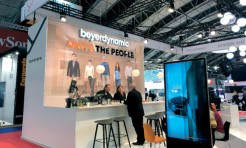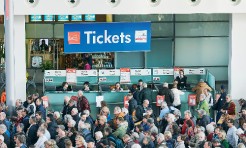What’s the best way to proceed with a trade fair appearance project?
FAMAB has developed a concept that describes the process involved in organising a trade fair and brand appearance in five phases – from planning to implementation.

Expert: Elfie Adler
Managing director
FAMAB
Verband Direkte Wirtschaftskommunikation
1st phase: acquisition/offer
FAMAB members are committed to pricing that is easy to understand, clear descriptions of the work involved and invoicing based on the work done. Understandable pricing means that services are described and evaluated individually – by subdividing them into units that make sense, such as transport, flooring, etc. The customer can thus understand what services are involved and gets no nasty surprises in the form of additional charges. In addition, FAMAB members argue that their costs for drafts and presentations should be calculated and included.
2nd phase: planning and organisation
As of this phase, FAMAB members document in full all the steps involved in the project and update them without being requested to do so. In this way, they provide their customers with transparency with regard to costs, quality and the schedule throughout the project. A named contact person is available to customers from this point onward. Because third-party products and services are included in planning as well as the FAMAB member’s own, purchased products and services are subjected to a quality assurance process. In other words, suppliers and service providers have to be checked by means of standardised procedures before any orders are placed. Their credit ratings are checked as well as their capabilities and product quality.

3rd phase: production
FAMAB members place emphasis on the sustainable, systematic use of materials in production: where it is possible and makes sense, materials are used more than once. The project is implemented in accordance with the plans and continuous quality checks are carried out to ensure consistent quality of execution.
4th phase: logistics and construction
FAMAB members carry out construction time planning in order to implement a project, starting with order placement. Parts are often assembled in advance. Depending on the complexity of the stand, logistics planning may also be required for deliveries to the site. In all their work, the members take particular care to comply with statutory provisions and local regulations, including those designed to ensure health and safety at work – such as working time regulations and regulations on the safety of equipment, licences for machine operators, personal protective equipment and structural safety measures. In the case of projects in distant countries, this is generally dealt with (in smaller projects) by a well-known local partner or one of the company’s own project managers. For all work not done on company premises, the shortest path is selected. For example, parts are not brought back to the company; instead, they are taken straight to the venue of the customer’s next event. FAMAB members also take sustainability into account when it comes to packing, security and waste disposal. The assembly phase ends with handover to the customer and is documented by means of a handover certificate. At the trade fair, staff are required to behave impeccably in their conduct towards customers, colleagues and competitors: the customer’s wishes must be respected and, wherever possible, implemented. The code includes reasonable behaviour towards colleagues, even when the pressure is on. Competitors are also treated respectfully.
5th phase: implementation/service/post-processing
FAMAB members ensure that a contact person is available at all times during the event in addition to the qualified stand-by personnel. Both of these are important: If the dishwasher breaks down, for example, the project manager who is on call at night is not much use. On the other hand, the dishwasher repair man is of no help when changes have to be made to the stand. Construction site reports, project management documentation and post-calculations are used in the internal project post-processing. These provide the basis for a feedback session with the customer. The post-calculations can be necessary as a result of unforeseeable circumstances such as the hall’s sprinklers coming on erroneously or in the event of unspecified offers or, most annoyingly, misunderstandings. All customer complaints are dealt with systematically, and the participants actively search for solutions in the interests of a successful long-term working relationship.
This article was published in TFI issue 2/2013
Share in Facebook, Twitter or Google+:
TFI - Trade Fairs International - The International Trade Fair Magazine.
© 2006 - 2024 by TFI-Verlagsgesellschaft mbH. All rights reserved. TFI-Verlagsgesellschaft mbH shall accept no responsibility for the contents of external links and other contents.
TFI-Know-how
-
What to do when things go wrong at virtual or in-person events?

In the event world, it’s simply part of life if things don’t work out as planned.
-
How can networking be made to work at online events?

Networking typically happens at real, in-person events. But it’s also possible to do it online; it just works a little differently. There are various options available to organisers.
-
How can exhibitors stand out at trade fairs?

New products and a well-conceived stand design are not the only drivers for a successful presence. Many other factors are also important, but trade fair planners often lose sight of them.
-
How can industry decision-makers be reached online?

Trade fairs and trade fair companies need to constantly further develop, become more agile and flexible and offer services all year round. New, digital offerings are very important here. With its TrustedTargeting technology, Messe München offers its customers access to leading business-to-business decision-makers on the Internet.


